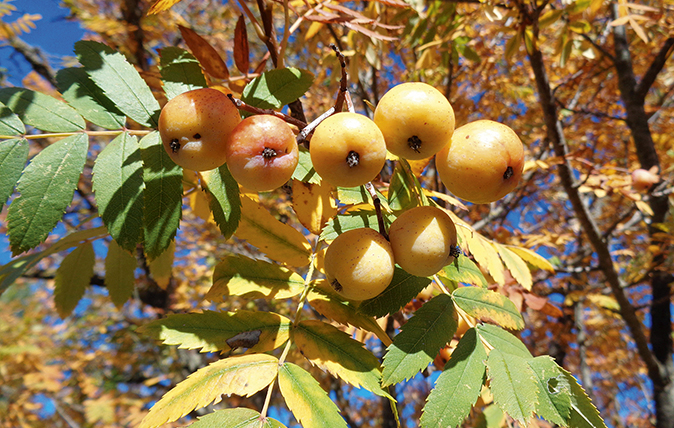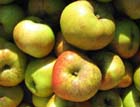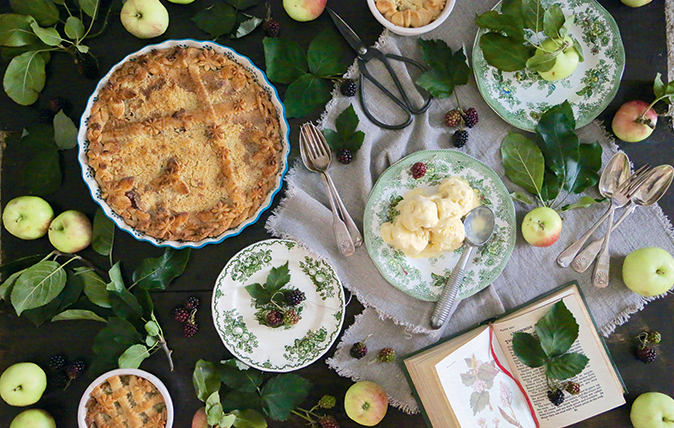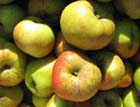The autumnal fruit that makes a questionable home-made liqueur
Charles Quest-Ritson explores the sorb apple, an astringent fruit added to apples to make a particular variant of cider.


There are two types of sorbs. One is the delightful Slavonic people who live in Germany’s beautiful Spreewald and press the seeds of common blue flax to make a salad dressing. And the other is a species of rowan known as the service tree – or Sorbus domestica by botanists.
It turns up very occasionally in the woodlands of southern England and Wales where tremendous efforts are made to conserve the few remaining specimens, which is rather unnecessary since the trees are not native to the British Isles but probably just escapees from medieval monastery gardens.
A service tree in full autumn beauty is a staggering sight. The fruits hang down in clusters, rather like its cousin, the common mountain ash or rowan, but the individual fruits are much bigger – the size of a large cherry – and they usually ripen to red on their sunny side. The species is native to Mediterranean hills, especially Italy and Greece, but you also see it inland throughout the Balkans and much of south-west France. The leaves look like any other rowan – long and pinnate – and produce a bit of autumn colour, but not much. Anyway, it’s the fruits for which people grow it.
Sir Thomas Hanbury saw them sold in the market at Menton in the 1860s and immediately ordered some trees for his garden at La Mortola, where they thrive today. You can still buy sorbs in the markets of Menton. Some years ago, I spied them offered at nearby Ventimiglia and immediately bought half a kilo of them. Then, of course, I wondered what to do with them. All the books I consulted said that they were inedible until after they had been ‘bletted’ – softened by frost and allowed to become over-ripe and squishy, rather like medlars. That gave me time to do more research, but eventually I really had to decide how to use them. There were two options – steep them in vinegar, or steep them in brandy and sugar. I chose brandy. Sieved and filtered, ‘Sorb Brandy’ joined the other bottles of spirits and liqueurs that we all accumulate and never drink. Except that I did eventually drink it, more in defiance than for pleasure, because the strange mushy taste of the fruits did not improve with age. ‘What a waste of brandy’ said my wife.
Some years ago, late in September, we were driving up the Route Napoléon, the most beautiful road in France, after a few days garden-visiting on the Riviera. We turned a corner and beheld a solitary specimen of Sorbus domestica by the roadside. It was heavy with ripe sorbs and I stopped immediately to pick some. Then I wondered whether it was a protected species and decided that it would be safest just to collect a few that had fallen to the ground. When I got home, I decided to sow the seeds, hoping they would germinate, so that I could grow sorbs in my own garden. Whenever I sow a batch of seeds – anything from broad beans to cosmos – I usually find that all of them germinate, or none at all. My sorbs knew that life was for living and germinated vigorously early in the spring. I potted up 20 and threw away the rest. The chosen 20 continued to grow enthusiastically and had to be put into larger pots later in the year. I felt really pleased with them—and with myself.
Then a new problem arose: what should I do with 20 trees? A clump or an avenue, perhaps? But our garden is too small for that and I have to be very strict about what I plant. So, of course, I started to give them away. Most of them went to rather surprised neighbours as thank-yous for asking us to lunch or supper. A young man who makes cider was delighted to have a couple of trees because sorbs are added to the apples to make a particular variant of cider in Hessen, that lovely region of Germany where cider, rather than wine, is drunk at all civic occasions.
I’ve planted out three, they should grow well on our thin, chalky soil; but that still leaves me with half-a-dozen trees to give to the village plant sale. I wonder how saleable they will prove to be, even in an upmarket area like the Itchen valley.
Exquisite houses, the beauty of Nature, and how to get the most from your life, straight to your inbox.

Cider recipe: how to make cider
Making scrumpy cider is a delicious way to use up your glut of apples

Apple and blackberry crumble pie with amaretti ice cream
Apples are a firm British favourite and deservedly so.

The best apples for picking, eating and storing
Much wisdom on English apples has been lost. Here Kathryn Bradley-Hole takes some advice from an old sage on the
Country Life is unlike any other magazine: the only glossy weekly on the newsstand and the only magazine that has been guest-edited by His Majesty The King not once, but twice. It is a celebration of modern rural life and all its diverse joys and pleasures — that was first published in Queen Victoria's Diamond Jubilee year. Our eclectic mixture of witty and informative content — from the most up-to-date property news and commentary and a coveted glimpse inside some of the UK's best houses and gardens, to gardening, the arts and interior design, written by experts in their field — still cannot be found in print or online, anywhere else.
